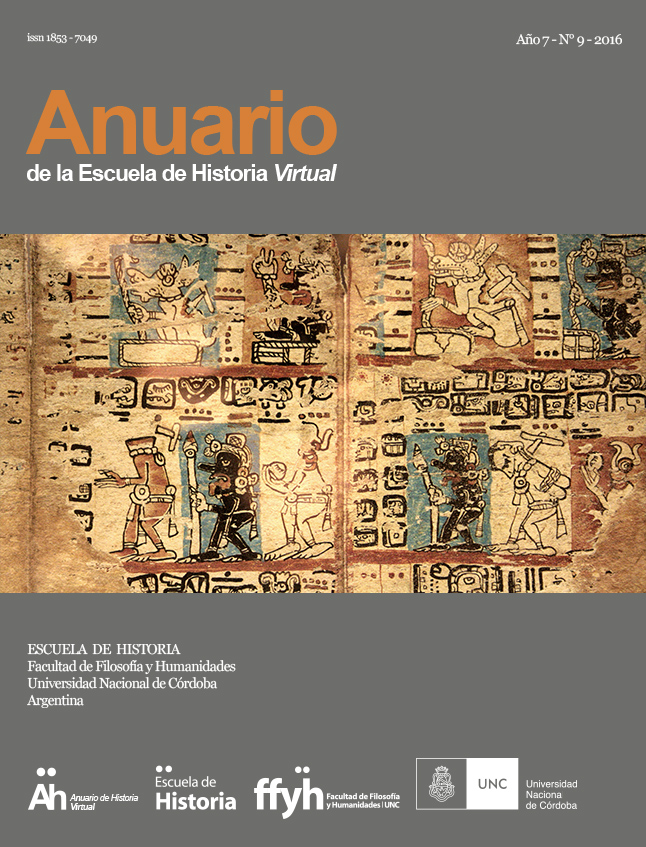The Moving Truth: Openness, Irony and Poetical Response in Polybius' Histories
Main Article Content
Abstract
The paper investigates the relationship between truth and fate's movement in Polybius' narrative. It has three sections. The first one discusses the articulation between theoretical snippets in which historical truth and ethical statements are associated. The second one discusses pinpoint examples of ethical statements about characters whose acts turn the narrative into an analogous to fate's movement. The last one discusses the articulation between concepts like openness of the past (J. Grethlein), moderate irony (M. Jay), in-determination of multiplicity and movement.
This section tries to understand Polybius’ Histories as a “poetical response to the aporetics of time” (M. Soares).
Article Details
Bajo los siguientes términos:
Atribución - Usted debe dar el crédito apropiado, proporcionar un enlace a la licencia e indicar si se hicieron cambios. Usted puede hacerlo de cualquier manera razonable, pero no de ninguna manera que sugiera que el licenciante lo respalda a usted o a su uso.
No comercial - Usted no puede utilizar el material con fines comerciales.
NoDerivados - Si remezclas, transformas o construyes sobre el material, no puedes distribuir el material modificado.
References
AGAMBEN, G., Ideia da prosa, Lisboa, traducción, prefacio y notas de J. Barrento, 1999.
CROCE, B., La storia come pensiero e come azione, Bari, 1954.
DAVIDSON, J. “The gaze in Polybius' Histories” (pp. 10-24), JRS 81, 1991.
DOSSE, F., “Les régimes d'historicité comme traces expérimentielle” (pp. 1-20), 19th International Congress of Historical Sciences, 6-13 de agosto, 2000, Oslo, 2000.
ECKSTEIN, A. M., Moral Vision in the Histories of Polybius, Berkeley-Los Angeles, 1995.
GRETHLEIN, J., “'Future past': time and teleology in (ancient) historiography” (pp. 309-330), H & T 53, 2014
HARPHAM, G. G., “Ethics and literary criticism” (pp. 371-385), en C. KNELLWOLF y C. NORRIS (eds.), The Cambridge history of literary criticism v. 9, Cambridge, 2008.
JAY, M., “Intention and irony: the missed encounter between Hayden White and Quentin Skinner” (pp. 32-48), H&T 52, 2013.
JAY, M., “Intention and irony: the missed encounter between Hayden White and Quentin Skinner” (pp. 32-48), H&T 52, 2013.
LOEWY, M., Walter Benjamin: aviso de incêndio, San Pablo, traducción de W. N. C. Brant, 2005.
MAAS, W. P. M. D. “Uma abordagem comparativa da ironia. Conceito, tropo e performance” (pp. 49-62), Aletria: Revista de Estudos de Literatura 20, 2010.
MILTSIOS, N., The shaping of narrative in Polybius, Berlín-Nueva York, 2013.
MORENO LEONI, A. M., “Polibio, el mundo helenístico y la problemática cultural: algunas líneas de reflexión en los últimos veinte años” (pp. 123-151), De rebus antiquis 2, 2012.
MORENO LEONI, A. M., “Prónoia, Teodoto y las virtudes helénicas: Los etolios en las Historias de Polibio” (pp. 75-102), Anales de Filología Clásica 22, 2009.
PÉDECH, P., La méthode historique de Polybe, París, 1964.
POLYBIUS. Historiae, Ed. Th. Büttner-Wobst, 5 vols., Leipzig, 1967-95 (reimp).
ROMANO, C., “Challenging the transcendental position: the holism of experience” (pp. 1-21), Continental Philosophy Review 44, 2011.
SEBASTIANI, B. B., “Historiografia como opção de vida: interpretações da exortação de Aníbal em Plb. 3.62-3” (pp. 11-29), Espaço plural 30, 2014.
SOARES, M. T. M., “Ekphrasis e enargeia na historiografia de Tucídides e no pensamiento filosófico de Paul Ricoeur” (pp. 1-23), Talia dixit 6, 2011.
SOARES, M. T. M., “Ekphrasis e enargeia na historiografia de Tucídides e no pensamento filosófico de Paul Ricoeur” (pp. 1-23), Talia dixit 6, 2011.
SOARES, M. T. M., História e ficção em Paul Ricoeur e Tucídides, Porto, 2014.
SOARES, M. T. M., Tempo, mythos e praxis. O diálogo entre Ricoeur, Agostinho e Aristóteles, Porto, 2013. THORNTON, J., “Polibio l'artista” (pp. 827-842), Mediterraneo antico 16, 2013.
THORNTON, J., “Oratory in Polybius' Histories” (pp. 21-42), en C. KREMMYDAS y K. TEMPT (eds.), Hellenistic oratory. Continuity and change, Oxford, 2013.
WALBANK, F., A historical commentary on Polybius, vol. II, Oxford, 1967.
WALBANK, F., Polybius, Berkeley, 1972.
